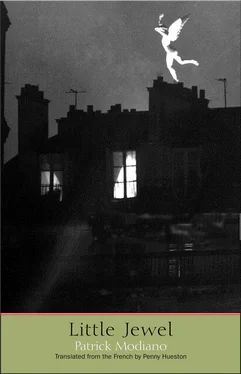In the phone box, she kept talking. She seemed so engrossed by the conversation that I drew nearer without her noticing me. I even pretended to be waiting for my turn to use the telephone. I thought I might catch a few words that would help me to understand better what this woman in the yellow coat and slipper socks had become. But I couldn’t hear a thing through the glass. Perhaps she was calling one of the people in the address book, the only one she hadn’t lost contact with, or who hadn’t died. Often, there’s someone who remains a constant presence in your life, someone you can’t ever shake off, someone who got to know you in the good times but is still there beside you when you’re down and out, still supportive, the last true believer, with the blind faith of a simpleton. A no-hoper like you. A devoted friend. Forever the punching bag. I tried to imagine what this man, or woman, at the other end of the line might look like.
She came out of the phone box. She looked at me idly, the same look she’d given me in the metro. I opened the glass door. Without dropping a token in the slot, I dialled a number at random, for no reason, waiting for her to move away. I kept the receiver against my ear, even though there wasn’t a dial tone. Silence. I couldn’t find the resolve to hang up.
She went into the café next to the chemist. I hesitated before following her, but decided that she wouldn’t notice me. Who were we, the two of us? A woman of indeterminate age and a young woman, both lost in the crowd in the metro. No one would have been able to single us out. And, when we surfaced outside, we were just like the thousands and thousands of people who return to their neighbourhoods every evening.
She was sitting at a table at the back. The chubby blond barman had brought her a kir. I would have to check whether she came here every evening, at the same time. I was determined to remember the name of the café. Le Calciat, 96 Avenue de Paris. The name was written in white letters in a semicircle on the glass door. In the metro, on the way back, I repeated the name and address to myself, over and over, so I could write it down as soon as possible. There was no death in Morocco. The secret life continued. A kir every evening at Le Calciat and the other patrons got used to seeing the woman in the yellow coat. No one thought twice about her.
I sat down at a table not far from hers. I ordered a kir, too, raising my voice so she might hear, hoping she would take it as a sign of complicity. But she remained impassive. Her head was slightly tilted, her expression at once severe and wistful, her arms folded, leaning on the table, the same pose as in the painting. Whatever happened to that painting? It followed me around during my childhood. It was hanging in my bedroom in Fossombronne-la-Forêt. ‘That’s the portrait of your mother,’ I was told. A fellow called Tola Soungouroff had painted it in Paris. The name and the city were written in the bottom left-hand corner. Her arms were folded, like they were now, though she was wearing a heavy chain-link bracelet around one wrist. That was my pretext for starting a conversation. You look just like a woman whose portrait I saw last week at the flea market in Porte de Clignancourt. The painter’s name was Tola Soungouroff . But I couldn’t find the wherewithal to get up and go over to her, even assuming I were able to get the words out without making a mistake: The painter’s name was Tola Soungouroff, and your first name, Sonia, was made up; the real one, as it appears on my birth certificate, was Suzanne . But, once I’d raced through that sentence, how would it make anything clearer for me? She would pretend not to understand, or else she’d stumble over her words, and they’d come out all jumbled, because she hadn’t talked to anyone for so long. Or she would lie, she would cover her tracks, like she did at the time of the portrait and the photos, by lying about her age and by giving a false first name. And surname. And even a false title of nobility. She used to let people believe that she had been born into a family from the Irish aristocracy. She must have had dealings with an Irishman, otherwise she would never have come up with that idea. An Irishman. My father, perhaps — who would be difficult to track down, and whom she must have forgotten. She had probably forgotten everything else, and would be surprised that I had raised it with her. That person was someone else, not her. The lies had dissolved over time. But I was sure that, back then, she believed every last one of them.
The chubby blond barman brought her another kir. Now there were a lot of people standing at the bar. And all the tables were full. We would not have been able to hear each other in the hubbub. I had the feeling that I was still on the metro. Or, rather, in the waiting room of a station, without knowing exactly which train to catch. She was putting off going home. It probably wasn’t far away. I was genuinely curious to know where she lived. I had no desire at all to speak to her; I felt nothing in particular towards her. Circumstances had prevented us from sharing what people call the milk of human kindness. The only thing I wanted to know was where she had washed up, twelve years after her death in Morocco.
IT WAS A little street near the Château de Vincennes or its fort. I’m not exactly sure what the difference is between the two. The street was lined with single-storey houses, garages and even stables. Indeed, it was called Rue du Quartier-de-Cavalerie. In the middle, on the right-hand side, a large dark-brick apartment block stood out. Night had fallen by the time we stepped onto the street. I was still walking a few steps behind her, but little by little I reduced the distance between us. I was certain that, even if I walked level with her, she wouldn’t notice me.
I revisited this street later, during the day. You headed past the brick apartment block, and were going to end up in a wasteland. There was not a cloud in the sky. When you got to the end of the street, it opened onto a sort of vacant lot, which bordered a much larger area. There was a sign: ARMY OPERATIONS. Beyond that was the Bois de Vincennes park.
But, at night, this street looked like any other suburban street: Asnières, Issy-les-Moulineaux, Levallois…She was moving slowly, with her dancer’s walk. It mustn’t have been easy in slipper socks.
The dark mass of the apartment block dominated all the other buildings. Why was it here, in this street? On the ground floor there was a grocery store about to close for the night. The fluorescent lighting had been turned off and the only light was at the cash register. Through the glass I could see her taking food off the back shelves, one can, then another. And a black packet. Coffee? Chicory? She clutched the cans and the packet against her coat but, once she got to the register, she fumbled. The cans and the packet tumbled to the ground. The fellow at the register picked them up. He smiled at her. Their lips were moving, and I would have liked to know what name he called her. Her true, unmarried name? She left, cradling the cans and the packet against her coat with both hands, as if she were carrying a newborn baby. I almost offered to help, but Rue du Quartier-de-Cavalerie suddenly seemed like a backwater, a long way from Paris, in a garrison town. Soon everything would be shut, the town would be deserted, and I would miss the last train.
She went through the metal gate. The minute I saw this dark-brick building, I had an intuition that she lived there. She crossed the courtyard, at the end of which were several identical apartment blocks. She was walking more and more slowly, perhaps frightened that she would drop her shopping again. From behind, it looked as if it was too heavy for her, and that, at any moment, she was about to stumble.
Читать дальше












